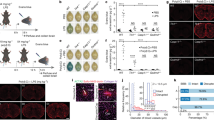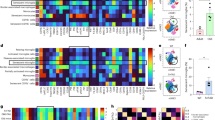Abstract
PROGRESSIVE multifocal leukoencephalopathy (PML) is a demyelinating disease of the central nervous system (CNS) which has so far been recognised only in man1,2. Although it is an infrequent cause of clinical neurological disorder3, it is of particular interest because of its frequent association with diseases in which immunological competence is impaired4–7, and because it is the only chronic demyelinating disease of man in which a virus (papovavirus) has been consistently demonstrated4,5,8,9. So far, efforts to transmit the disease to non-human primates have failed8. This report of a spontaneous disease in macaques with striking similarities to PML seems to be the first recorded instance of such a condition in animals.
This is a preview of subscription content, access via your institution
Access options
Subscribe to this journal
Receive 51 print issues and online access
$199.00 per year
only $3.90 per issue
Buy this article
- Purchase on Springer Link
- Instant access to full article PDF
Prices may be subject to local taxes which are calculated during checkout
Similar content being viewed by others
References
Astrom, K-E., Mancall, E. L., and Richardson, E. P., Jr, Brain, 81, 93–111 (1958).
Richardson, E. P., Jr., New Engl. J. Med., 265, 815–823 (1961).
Weiner, L. P., Johnson, R. T., and Herndon, R. M., New Engl. J. Med., 288, 1103–1110 (1973).
Weiner, L. P., et al., New Engl. J. Med., 286, 385–390 (1972).
Narayan, O., Penney, J. B., Jr., Johnson, R. T., Herndon, R. M., and Weiner, L. P., New Engl. J. Med., 289, 1278–1282 (1973).
Knight, A., O'Brien, P., and Osoba, D., Ann. Intern. Med., 77, 229–233 (1972).
Ellison, G. W., J. Neuropath. exp. Neurol., 28, 501–506 (1969).
ZuRhein, G. M., Prog. med. Virol., 11, 185–247 (1969).
Padgett, B. L., Walker, D. L., ZuRhein, G. M., Eckroade, R. J., and Dessel, B. H., Lancet, i, 1257–1260 (1971).
Pinkerton, H., and Carroll, S., Am. J. Path., 65, 543–548 (1971).
Manz, H. J., Dinsdale, H. B., and Morrin, P. A. F., Ann. intern. Med., 75, 77–81 (1971).
Bolton, C. F., and Rozdilsky, B., Neurology, Minneapolis, 21, 72–77 (1971).
Silverman, L., and Rubinstein, L. J., Acta Neuropath., 5, 215–224 (1965).
Fermaglich, J., Hardman, J. M., and Earle, K. M., Neurology, Minneapolis, 20, 479–484 (1970).
Gibson, J. P., Rohovsky, M. W., and Newberne, J. W., Lab. Animal Sci., 21, 62–66 (1971).
Dove, J. T., Chaparas, S. D., and Hedrick, S. R., Am. Rev. resp. Dis., 106, 485–487 (1972).
Jungherr, E. L., Cabasso, V. J., and Stebbin, M., J. Neuropath. exp. Neurol., 22, 512–527 (1963).
Author information
Authors and Affiliations
Rights and permissions
About this article
Cite this article
GRIBBLE, D., HADEN, C., SCHWARTZ, L. et al. Spontaneous progressive multifocal leukoencephalopathy (PML) in macaques. Nature 254, 602–604 (1975). https://doi.org/10.1038/254602a0
Received:
Published:
Issue Date:
DOI: https://doi.org/10.1038/254602a0
This article is cited by
-
Preparatory adaptations for winter survival in the cold hardy beetles,Dendroides canadensis andDendroides concolor
Journal of Comparative Physiology ? B (1983)
-
Induction of antifreeze protein production by juvenile hormone in larvae of the beetle,Dendroides canadensis
Journal of Comparative Physiology ? B (1983)
Comments
By submitting a comment you agree to abide by our Terms and Community Guidelines. If you find something abusive or that does not comply with our terms or guidelines please flag it as inappropriate.



